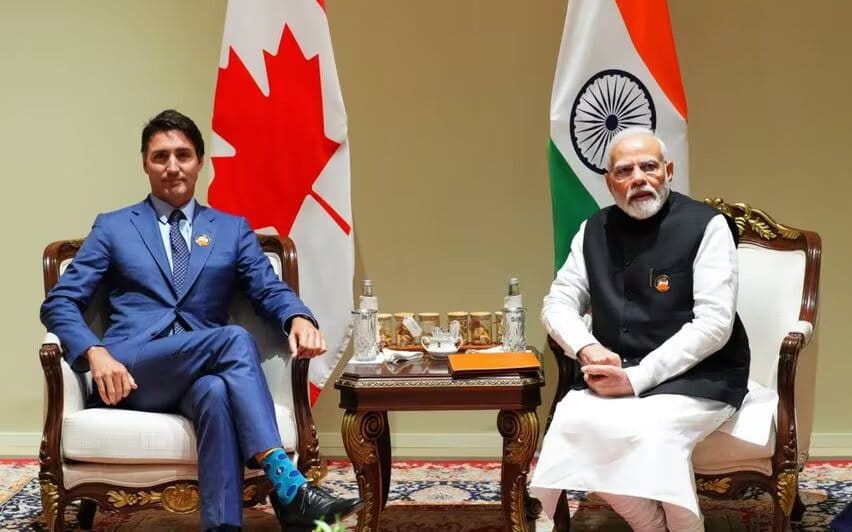Canada and India have expelled each other's embassies due to growing disagreement about an assassination in 2023
“Regrettably, as India did not agree, and given the ongoing public safety concerns for Canadians, we served notices of expulsion to these individuals,” Joly explained.

On Monday, Canada and India expelled six of each other’s diplomats, marking a significant escalation in the ongoing dispute over the June 2023 assassination of Sikh activist Hardeep Singh Nijjar in Canada.
Prime Minister Justin Trudeau announced that Canada would expel India’s high commissioner and five other diplomats, after Canadian police uncovered evidence of a targeted campaign against Canadian citizens by Indian government agents.
The six diplomats were identified as persons of interest in the investigation.
“We will never tolerate the involvement of a foreign government threatening and killing Canadian citizens on Canadian soil,” Trudeau stated, describing India's actions as a "monumental mistake" for using diplomats and organized crime to harm Canadians.
India’s foreign ministry responded by expelling Canada’s acting high commissioner, deputy high commissioner, and four other diplomats, demanding they leave by the end of the week.
The Indian government also rejected Canada's claim that its ambassador was a “person of interest” in the Nijjar assassination.
Last year, Trudeau indicated that credible allegations connected the Indian government to Nijjar’s killing. Canadian Foreign Minister Mélanie Joly revealed that the Royal Canadian Mounted Police (RCMP) had gathered substantial evidence identifying six individuals as key figures in the case.
Joly noted that Canada had requested India to waive diplomatic immunity and cooperate in the investigation, but India refused.
“Regrettably, as India did not agree, and given the ongoing public safety concerns for Canadians, we served notices of expulsion to these individuals,” Joly explained.
She called on India to support the ongoing investigation, emphasizing the importance of resolving the issue for both countries.
RCMP Deputy Commissioner Mike Duheme stated that police had evidence linking Indian agents to other homicides and violent incidents in Canada, though he withheld details.
He mentioned that more than a dozen credible threats had been directed at members of the South Asian community, particularly those involved in the pro-Khalistan movement, but attempts to engage with Indian law enforcement had been unsuccessful.
Duheme highlighted the depth of the criminal activities orchestrated by Indian government agents, warning that these actions pose a threat to the safety of Canadians.
India dismissed these accusations as absurd. Nijjar, a 45-year-old Canadian citizen originally from India, was shot dead in his truck after leaving the Sikh temple he led in Surrey, British Columbia.
He was a prominent figure in the Khalistan movement, which seeks an independent Sikh state. Four Indian nationals living in Canada have been charged with his murder.
India had designated Nijjar a terrorist in 2020 and was seeking his arrest at the time of his death for alleged involvement in an attack on a Hindu priest.
Relations between Canada and India have soured since the murder, with India last year demanding the removal of 41 of Canada’s 62 diplomats from the country.
The pro-Khalistan movement has long been a source of tension between India and Canada. New Delhi has criticized the Trudeau government for its perceived leniency toward Khalistan supporters in Canada, where Sikhs constitute nearly 2% of the population.
India has urged countries like Canada, the U.K., and Australia to crack down on Sikh activists.
On Monday, India’s foreign ministry asserted its right to take further action, accusing Canada of supporting extremism and separatism.
It summoned Canada’s top diplomat in New Delhi to protest the expulsion of Indian officials, calling it "unacceptable."
Meanwhile, the U.S. State Department confirmed that an Indian inquiry committee investigating a plot to assassinate another Sikh separatist leader in New York would meet U.S. officials in Washington as part of ongoing investigations.
This plot had been thwarted, and U.S. prosecutors had earlier charged an individual involved, though the Indian official alleged to have directed the scheme was not publicly named.
India expressed concern over the U.S. investigation at the time but said it was taking the matter seriously.





